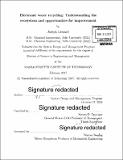Electronic waste recycling : understanding the ecosystem and opportunities for improvement
Author(s)
Lessard, Joseph, S.M. Massachusetts Institute of Technology
DownloadFull printable version (10.48Mb)
Other Contributors
System Design and Management Program.
Advisor
Steven D. Eppinger.
Terms of use
Metadata
Show full item recordAbstract
With the growth of the smartphone industry a commensurate growth in the volume of electronic waste has occurred. Electronic waste is any electronic or electrical device that has reached the end of its useful life and has been disposed of by a consumer. The volume of this waste stream is the fastest growing waste stream globally and has begun to impact the developing world disproportionately as these regions are often at the receiving end of an endless stream of hazardous waste components. The industries that handle electronic waste must be thought of as a System of Systems or ecosystem if real improvement is to be made. The ecosystem can be decomposed into three major systems: collection, which collects electronic waste from consumers and introduces it to the recycling process; pre-processing, which turns electronic waste into discrete material streams for ultimate recycling; and end-processing, which turns individual material streams into raw materials with market value. Improving the overall recycling ecosystem is a critical component of making global industrialization sustainable. This improvement must address both the individual challenges facing each component system in the ecosystem as well as the broader challenges that span the whole ecosystem. The three component systems of the ecosystem face economic, social, environmental, and technological challenges. As a result, the available solution space is broad and varied. However, from an ecosystem perspective, the greatest challenges exist at system interfaces and the greatest opportunity exists in improving these interfaces. In so doing, improved communication between systems and stakeholders will drive the overall improvement of the ecosystem. This communication should generate a uniform set of requirements for how the system should operate. In turn, measuring success in the ecosystem and meeting the requirements requires alignment of goals for each system with those of the broader ecosystem. Finally, a fourth member of the ecosystem-the device manufacturers-must play a crucial role in facilitating this interface management; in this sense, manufacturers have the opportunity to become the de facto architects of this evolving system. As architects, manufacturers could exert more power to realize the changes required while also guiding the ecosystem to more sustainable ground.
Description
Thesis: S.M. in Engineering and Management, Massachusetts Institute of Technology, School of Engineering, System Design and Management Program, 2017. Cataloged from PDF version of thesis. Includes bibliographical references (pages 133-139).
Date issued
2017Department
Massachusetts Institute of Technology. Engineering and Management Program; System Design and Management Program.Publisher
Massachusetts Institute of Technology
Keywords
Engineering and Management Program., System Design and Management Program.